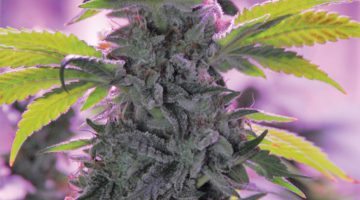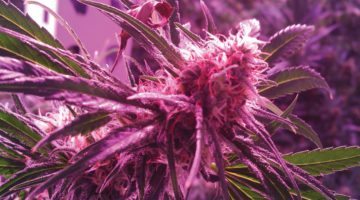
Marijuana grows in a cultivation center in Las Vegas on July 14. Nevadans will vote on the recreational marijuana initiative in November.
Nevada is known for promoting activities that other states in the country consider illegal. It is the mecca for gambling, is the home to excessive partying, and the state even has legal prostitution. Yet Nevada is not the most progressive state on the West Coast — let alone the country — when it comes to marijuana use.
In November, Arizona, California, Maine, Massachusetts and Nevada are voting on legalizing recreational marijuana use. As of now, marijuana is a Schedule I drug and use is heavily restricted by the federal government.
Nevada is one of 25 states to legalize medical marijuana. The bill passed by popular vote in 2000, but it wasn’t until 2013 that the state created the system and regulations necessary for businesses to sell medical cannabis, and in 2015 Nevada’s first dispensary opened its doors.
“It is a great feeling after two and a half years to have all of our businesses open and operating,” said Demetri Kouretas, CEO of The Grove, a medical cannabis dispensary in Las Vegas and Pahrump.
The Grove is not only comprised of the two dispensaries but also a state-of-the-art cultivation and production facility.
Nevada also decriminalized the possession and distribution of marijuana in 2001, giving lower sentences and fines to those guilty of committing these crimes.
What Question 2 is asking
Question 2 on Nevada’s ballot this November asks, “Shall the Nevada Revised Statutes … allow a person, 21 years old or older, to purchase, cultivate, possess, or consume a certain amount of marijuana … impose a 15 percent excise tax on wholesale sales of marijuana; require the regulation and licensing of marijuana cultivators, testing facilities … and provide for certain criminal penalties?”
In layperson’s terms, if this passes anyone in Nevada over the age of 21 can buy 1 ounce of marijuana, have it on them at any given time and it is not considered a crime. The initiative allows for the state to only give out a certain number of dispensary licenses per county based on its population. Dispensaries are not allowed within 1,000 feet of any K-12 school or within 300 feet of a community center.
There is still a criminal charge for possessing over the legal limit, distributing marijuana to people under 21 years of age and falsely claiming to be of legal age. This initiative does not stop the ability of employers to ban employees from marijuana use or business owners from restricting it from their properties.
The initiative calls for a 15 percent sales tax on recreational marijuana sales, which will be returned to the state for funding the regulatory functions of this endeavor, and any additional funds generated will be put toward Nevada’s education system.
Medical marijuana’s impact on Nevada
Medical marijuana was introduced to Nevada in 2000, but it took more than a decade for it to become a reality.
Democratic Nevada Sen. Tick Segerblom, a longtime crusader of the marijuana fight and the legislator who shepherded the legislation through, has seen the economic benefits the medical marijuana industry has had in Nevada.
Segerblom says more than $300 million have been invested into Nevada’s economy just to get these dispensaries up and running, while more money has been streaming in from the actual sales revenue.
Dr. Sue Sisley, a nationally recognized researcher of medical cannabis with ties to dispensaries in Nevada, agreed that the industry has boosted the state’s economy.
“There were blighted areas that needed to be redeveloped, and the cannabis markets are breathing new life into these centers,” Sisley said.
Dispensaries have seen more than just an economic benefit when it comes to their work.
“I originally got involved in the medical marijuana business for the business aspect of it,” Kouretas said. “As time has gone on, it has become more than just a business. On the medical side of it, I have been able to gain more awareness and understanding of what medical marijuana can do for patients and how it has helped them.”
Sisley sees her patients improve with the help of cannabis. She does not see as many side effects as she does with pharmaceuticals, particularly the opiates that often are prescribed for various conditions, and some of her patients have switched to only using cannabis to treat their ailments.
“I’m seeing it in my practice; disabled patients start using medical cannabis and they get off welfare, start working and holding down jobs,” Sisley said.
A potential business opportunity
If Question 2 passes in November, a new study finds it will have even more of a benefit to Nevada’s economy.
RCG Economics and the Marijuana Policy Group released a study last week illustrating the projected results in the next seven years.
They estimate that the state’s annual marijuana market sales will increase to almost $300 million by 2018 and just over $485 million by 2024. They also expect that 54 percent of these sales will be to tourists.
They forecast that 3,298 full-time jobs will be created directly if the initiative passes, and 6,208 will be created over time.
The study shows that more than $1 billion will be added directly to Nevada’s economy, and the tax revenue just from marijuana from 2018-2024 will be north of $460 million.
“We are hoping that it will double our business or more if it goes recreational,” Kouretas said.
Republican Nevada Sen. Patricia Farley says she expects more retail and cultivation centers to be created or expanded if the initiative passes, generating more tax money.
Colorado has seen its marijuana industry gain a billion dollars a year since January 2014. Over 10,000 jobs were created since recreational marijuana was voted to be legal.
Recreational regulations
Officials with the Nevada Legislature and representatives from the marijuana community visited Colorado in June to learn how the state has regulated recreational marijuana. Their goal is to avoid what could be harmful mistakes while implementing the system in Nevada.
Should the initiative pass in November, marijuana is expected to be regulated like alcohol and other controlled substances.
Farley thinks people need to look for a commitment from the marijuana industry to regulate and enforce the rules, as well as make sure lawmakers address these concerns.
“My job as a legislator is to make sure I know the truth about how it has affected Colorado, Washington, Oregon and reach out to organizations like the Brooking’s Institute and tobacco, because Big Tobacco uses prevention and intervention programs and has been fairly successful,” Farley said.
Colorado tags each marijuana plant with a chip to help track the plant through its life. The state requires that every product be tested for potency and contaminants. It also must be sold in a child-proof container.
“Our regulations will mirror Colorado, and Colorado has one of the best regulatory enforcements,” Farley said. “It’s still tough and rigorous to get marijuana.”
Is Nevada ready for recreational marijuana?
Many people don’t seem to think so, including Gov. Brian Sandoval, U.S. Sen. Harry Reid, Nevada Attorney General Adam Laxalt and Lincoln County sheriffs.
Sandoval has stated his objections come from his days as a federal judge, where he saw young people led into trouble from marijuana use.
Reid told reporters in Las Vegas on Aug. 16, “That’s something we need to look at quite a bit longer. I think it’s something we have to be very careful with.”
Law enforcement worries about the number of impaired drivers on the road increasing, Lincoln County Sheriff Kerry Lee told the Lincoln County Record.
There isn’t a test available for law enforcement to quickly check if an individual is too high to be driving like there is for alcohol, to know how long ago the person used the substance or a way to tell if food in the car is infused with marijuana.
One thing that advocates for Question 2 argue is that police officers will have more time to focus on more serious crime. Chief John Jackson of Colorado’s Greenwood Village Police Department told The Boston Globe that what he sees is inconsistent with those expectations.
Dr. John Packham, director of health policy research at the UNR School of Medicine, says his biggest concern when it comes to the new initiative is youth access.
“There are all sorts of regulatory issues we can think about for already legal substances like tobacco and alcohol. Recreational marijuana will have its own unique aspects, but there are things that can be learned,” Packham said.
Packham says in his perfect world, 5 to 10 percent of the tax money going toward education would be earmarked for public health. He wants public health authorities to set up a way to collect baseline data to see if there is an increase in youth access. Still, he expects the initiative to pass.
Groups against Question 2’s passing have yet to be vocal in Nevada.
Join Together Northern Nevada has bought billboards showing images of food and asking if viewers could “spot the pot” as a way to show that children can’t tell the difference between marijuana-infused food and normal food. However, the group cannot take a stance on the initiative because it receives federal grants.
Nevadans for Responsible Drug Policy has a website dedicated to fighting the initiative, but the group hasn’t put out any advertising and does not plan to, according to what co-founder and Assemblyman Pat Hickey told the Las Vegas Review-Journal.
“The only real opposition we have been facing is from project SAM,” said Joe Brezny, spokesperson for Regulate Marijuana Like Alcohol in Nevada, the activist group behind support for the initiative. “Although they’re trying to come in at the last minute and change an issue that the majority of Nevadans have supported for years, we are debating them and fighting back at every turn.”
As of Aug. 29, Brezny’s group had reserved more than $900,000 worth of advertising space slated to run in the month before the election. Opposition groups have none.
The group says its latest poll is at 51 percent support for the initiative and 40 percent against, but it expects those numbers to tighten as Election Day gets closer.
“We support it because marijuana will be more accessible to people who can’t get it right now,” said Riana Durrett, the executive director of the Nevada Dispensary Association. “Marijuana is prevalent in our society already. We are not going to be increasing the amount of marijuana use; we’re going to be regulating the current marijuana use.”
Segerblom encourages the passing of this initiative so that people who are going to use marijuana, regardless of its legality, can know exactly what is in it because it will be tested to the highest standards.
He also thinks police will have more resources to dedicate to crime other than marijuana, and Nevada citizens and visitors won’t have to worry about being caught by the police.
He thinks legalizing recreational marijuana will only benefit Nevada and attract more tourists.
“I really feel it is the next step in Nevada’s evolution,” Segerblom said. “We are known around the world: go to Nevada and have a good time. Do things you might not do back at home.”
Madeline Purdue can be reached at jsolis@sagebrush.unr.edu and on Twitter @TheSagebrush.












